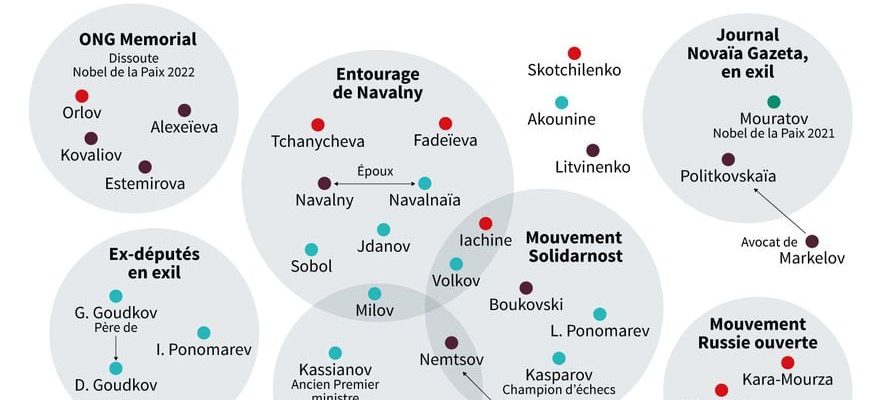Two less of the most influential dissident voices in the Kremlin, almost one after the other. After the death of Alexeï Navalny in his penal colony in the Arctic on February 16, Putin’s infernal machine this time struck another historic opponent: Oleg Orlov. Figure from the NGO Memorial, fighting for human rights in Russia and who won the Nobel Peace Prize in 2022, was sentenced this Tuesday, February 27, to two and a half years in prison. Aged 70, Orlov, who was already fighting to help political prisoners under Gorbachev during the USSR era, will finally have suffered the consequences of his fierce criticism of the Russian invasion of Ukraine.
If Vladimir Putin’s Russia has of course never been a haven of freedom, the repression against opponents of power has clearly increased since the start of the “special operation” in Ukraine on February 24, 2022. The observation is simple: very few opposition figures are 1. still in Russia, 2. not in prison, 3. still alive.
Beyond Oleg Orlov and Alexeï Navalny, we also find many other examples, such as that of Vladimir Kara-Mourza. A fervent opponent of the war in Ukraine and a harsh critic of the Putin regime, he had already been the victim of two poisonings, in 2015 and 2017. Before finally being sentenced in April 2023 to twenty-five years in prison for “high treason “, the term used to discredit any opposition, as well as for spreading “false information” about the Russian army, during a closed-door trial. Alexeï Navalny had the right to his prison in the Arctic, Kara-Mourza has the honor of serving his sentence… in Siberia.
Selection of political opponents, institutions, media or movements that opposed Vladimir Putin
© / AFP
The NGO founded by Alexeï Navalny, the Anti-Corruption Fund, is also persona non grata in Russia. Designated as a “terrorist organization” in June 2021 by the courts, all of its members are likely to be prosecuted and sentenced to prison terms. This was particularly the case of Ksenia Fadeïeva, a 31-year-old former deputy allied with Alexeï Navalny, sentenced at the end of 2023 to nine years in prison. Or already in June 2023, Lilia Tchanycheva, first collaborator of the Kremlin’s number 1 opponent, tried for creating an “extremist organization” and sentenced to seven and a half years in prison. Even Alexeï Navalny’s… lawyers have been arrested or are wanted by the Russian authorities.
The revealer of the presidential election of March 17
One upcoming episode particularly embodies the impossibility of any opposition being able to express itself in the country: the presidential election of March 17. Or rather the sham election, when the latter should allow Vladimir Putin to obtain a score as close as possible to 100%, in order to testify to the absolute plebiscite granted by the people for his regime and the war he is waging in Ukraine.
For this election, any candidacy opposing the head of the Kremlin was banned by the Moscow authorities. There was in particular the hope raised by Boris Nadejdine, a relatively anonymous 60-year-old politician who over the days became the figure of pacifism. Formerly close to Boris Nemtsov – an influential Russian opponent assassinated by five bullets in the back in 2015 – and advocating the end of the war in Ukraine, he raised hopes of the possibility of challenging Putin’s supremacy… before ultimately seeing his candidacy be invalidated by the Russian electoral commission. Last December, it was in the same way the candidacy of Ekaterina Dountsova, opponent of Putin and advocating the end of the war in Ukraine, which was invalidated. Without obviously forgetting all the main opponents condemned by the Kremlin’s repressive judicial machine, and made ineligible by Russian electoral law.
Faced with Vladimir Putin, three puppet candidacies were finally authorized: Leonid Sloutski, the leader of the Liberal Democratic Party of Russia, who promised for the master of the Kremlin a “huge” victory by assuring that he would “not take away his vote”; Nikolai Kharitonov, from the Communist Party, already a candidate in 2004 and whose party has always supported Vladimir Putin; and Vladislav Davankov, president of the New People party, not much more vehement towards the Russian president but who still supported the candidacy of Boris Nadezhdine in the name of pluralism. Suffice to say that this is not where dissenting voices will be expressed.
Opponents forced into exile
The vast majority of opponents of the regime therefore had no other choice than to flee Russia to be able to express themselves freely and try, as best they could, to organize the fight against Putin. Last December, L’Express provided a broad overview of the different currents and divisions within the opposition in exile to Vladimir Putin, from the oligarch Mikhail Khodorkovsky to the former chess champion Garry Kasparov, from the YouTuber Maxim Katz to Alexeï Navalny’s Anti-Corruption Fund. Complex relationships which could well evolve with the death of the latter, a figure as omnipotent as he is criticized even within the opposition. But also the announcement by his wife Youlia Navalnaïa of the resumption of his fight.
Among the opposition figures still at large in Russia, one stands out quite widely: that of Dmitri Muratov. Nobel Peace Prize winner in 2021 and editor-in-chief of the independent newspaper Novaia Gazetabanned from broadcast after the start of the war in Ukraine, he chose to stay and live in Russia while most of his editorial team now works from Latvia.
In an interview given to the newspaper The world in October 2023, as he prepared to return to Moscow, the Nobel Prize winner, described as a “foreign agent” by the Kremlin, justified his choice to stay in Russia. “It is very strange to live in your homeland without freedom, but it is just as strange to conceive of freedom without your homeland. The journalists who have left are doing remarkable work, without censorship, they are accomplishing their mission. Those who are remained remained with their readers.”
